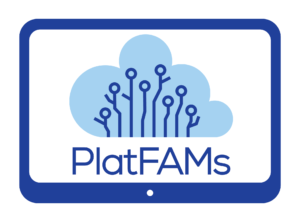
Digital platforms have penetrated deeply our everyday life, affecting people’s informal interactions, ways of living and understanding of the world, as well as the institutional structures that underpin these. Increasingly, digital platforms provide an infrastructure for learning, social connections, gaming, commerce and engagement with news, and their impact on homes and families was amplified by the COVID-19 pandemic. Despite growing research interest in the fundamental social, institutional and individual consequences of platformisation, we know less about how families are transforming with the everyday use of today’s heavily commercialised and globally networked platforms and their algorithms.
The PlatFAMs project focuses distinctively on intergenerational experiences in relation to the platformisation of family life. The core of the project is the study of up to one hundred three-generation families in five European countries (Norway, Estonia, UK, Romania and Spain) over a two-year period, across different spaces online and offline, using a broad range of qualitative and participatory methods. In addition, we will do secondary analysis of longitudinal quantitative data across European countries. The PlatFAMs project aims to understand how digital platforms are embedded in the lives and practices of modern families, raising key questions about conditions for informal learning, care and agency in family life today and consequences for the future.
Three thematic strands will be studied across families and generations. First, digital navigation and domestication; understood as the ways people interact with different platforms in order to identify inter-generational differences and similarities within diverse family structures. Second, digital negotiation and co-construction; understood as relational aspects within diverse family structures regarding connections and networking using digital platforms. Third, digital futuremaking as the process of anticipating and creating imaginaries of digital futures, both personal and societal, that shape present practices in ways that are consequential for families. At the intersection of perspectives from intergenerational research, family and youth studies, learning and literacy research, the project will bring cutting edge perspectives on the domestication and social impact of digital platforms to the field.
CONSORTIUM:
- Project Leader: Ola Erstad, University of Oslo, Department of Education, Norway, e-mail
- Veronika Kalmus, University of Tartu, Institute of Social Studies, Estonia, e-mail
- Sonia Livingstone, London School of Economics and Political Science (LSE), Department of Media and Communications, United Kingdom, e-mail
- Oana Benga, Universitatea Babes Bolyai/Babes-Bolyai University, Department of Psychology, Romania
- Moises Esteban-Guitart, University of Girona, Institute of Educational Research, Spain, e-mail
- Raquel Miño-Puigcercós, University of Barcelona, Department of Didactics and Educational Organization, Spain, e-mail
COOPERATION PARTNERS:
- Julianne Moss, Deakin University, Australia
- Varje Ojala, Estonian Union for Child Welfare
- Kerli Koiv, Association of Estonian Open Youth Centres
- Ramon Tremosa i Balcells, Government of Catalonia
- Tone Haugan-Hepsø, Norwegian Media Authority
- Anca Gaidoș, New Horizons Foundation
- Kristin Ruud, Seniornett
- Vicki Shotbolt, ParentZone
- Elisabeth Gosme, COFACE Families Europe
- Morten Søby, Norwegian Directorate for Education and Training
- Monica Nadal Anmella, Fundacio BOFILL
 Start date
Start date
1 October 2022
 Project duration
Project duration
36 months
 Project budget
Project budget
€ 1 497 042
Funding organisations


![]()
![]()

![]()